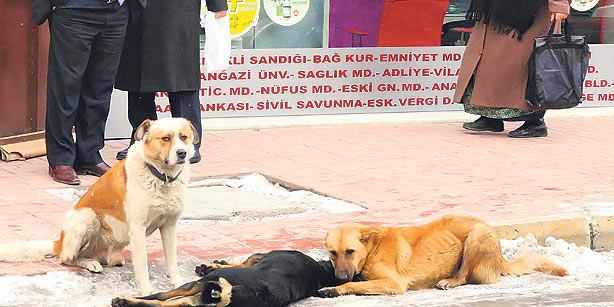https://www.haytap.org/index.php/201203263856/english-content/right-activists-count-down-to-criminalization-of-animal-cruelty
Haytap Activists Count Down to Criminalization of Animal Cruelty
In May 1937 the German language newspaper Frankfurter Zeitung reported that visitors to İstanbul 30 years prior found the city to be as overrun with dogs as the German town Hamelin was with rats.
Today dogs and indeed cats continue as they have for centuries, forming part of the unique makeup of İstanbul and many other Turkish cities. Sunbathing on parched city greens, lumbering through marketplaces and patrolling bus stops, Turkey’s doe-eyed canine population is showing no signs of dropping in numbers, although not for lack of trying, as the mass mistreatment of animals continues, for the most part, unnoticed and unpunished in everyday life.
Last month an assembly meeting spearheaded by Republican People’s Party (CHP) deputies Melda Onur and Umut Oran saw Turkey’s political parties pledge unanimous support for a bill proposed by the İstanbul Bar Association’s Animal Rights Commission and supported by over 12,000 signatures placing animal abuse under the Turkish Penal Code (TCK). The shortcoming of Turkey’s comprehensive Animal Welfare Act No. 5199 is that it only subjects offenders to fines under the Law on Misdemeanors and they get away with small fines all too often. Reclassifying animal cruelty under the penal code would make crimes against animals -- including the use of animals for gambling or entertainment purposes, such as cockfights and bullfights, the killing of incapacitated animals and any form of animal abuse -- punishable with a jail sentence of at least three years.
But speaking in an interview with Sunday’s Zaman, Animal Rights Federation (HAYTAP) President Ahmet Kemal Şenpolat said that simply reclassifying offenses as criminal conduct will not be sufficient to tackle the mistreatment of animals in Turkey.
Animals are not commodities
“We have been struggling for years for animal cruelty to be reclassified under the penal code, but a lot more needs to be done if we are truly to reach the crux of the problem. The first problem is that in Turkey animals are seen as commodities and viewed purely in terms of financial value. The second is that stray animals and pets are viewed differently,” Şenpolat explained.
He explained that if a pet is tortured or killed, the offender can be tried, but this is not because the animal suffered; it is because the owner suffered financial and property loss. “At the moment a case has been filed against a person who was caught on camera torturing a sick old cat in İzmir. The only reason we managed to get the case seen in court, however, is because it happened by coincidence that the cat had an owner. Had this not been the case the abuser would have merely been charged with a fine equating to that of a petty offense, such as smoking in an enclosed area or shouting on the street. How can a country like this expect to be accepted as a member of the European Union?” Şenpolat questioned. He added that while there has been no political opposition to the proposed change in law, there has also been a lack of concrete support.
“Society needs to stop viewing lobbying for animal rights as a hobby or pastime, but as a serious attempt to protect the fundamental right to life,” he said. He added that “we have waited a long time for this, but we hope that Parliament will accept our proposal and that the change in law will be in force by the summer.”
Bilge Okay of the Association to Protect Stray Animals (SHKD) said that despite the comprehensive nature of the legislation in Turkey, municipalities across the country continue to get away with facilitating or directly committing the mass murder of stray animals.
“Animals, especially dogs, are routinely poisoned, shot or rounded up by municipalities and abandoned to starve in forests in efforts to keep their numbers down. Turkish law specifies that municipalities should neuter and return all stray animals to where they were taken, but until failure to do this is made criminally punishable, it is unlikely that we will see a waning of these brutal massacres,” Okay explained.
The situation for animals in Turkey, however, was not always quite so grim. Neslihan Demir, a member of the newly formed Animal Party, pointed out in an interview with Sunday’s Zaman that during the early Ottoman era in Turkey there was a vibrant culture of caring for animals and birdlife. “Not only did mandates relate to the protection of horses and donkeys used for pulling carts and carriages, but there were also numerous foundations established specifically to care for birds, cats and dogs,” she said.
The SHKD’s Okay told Sunday’s Zaman that a glance through the archives of Turkish history reveals a surprising turn in fortune for Turkey’s animal populations. “It is true that during the early Ottoman era stray animals were treated with respect and care. Butchers were in the habit of giving scraps to dogs and animals would often benefit from old superstitions. For example if a person were ill they may have said prayers promising, ‘If I recover I will feed animals,’ and so forth. However in the first quarter of the 20th century, governments started to implement policies of poisoning, killing or isolating animals,” she said, giving the example of the case of Hayırsız Ada in 1910. Around 80,000 dogs were dumped on the island to die of hunger and thirst.
Interestingly, Okay says that a link can be drawn between the mistreatment of animals in Turkey and modernization. “Historically, Turkey doesn’t have a history of mistreating animals but, ironically, efforts to modernize Turkey came hand-in-hand with the implementation of draconian methods to attempt to control animal populations.”
“There are still hundreds of thousands of stray dogs in Turkey, so this goes to show of course that if killing worked, stray dog populations in Turkish towns would have been eliminated long ago,” Okay said. That this is why the SHKD and most other animal rights organizations in Turkey advocate the “neuter, vaccinate and let live” principle, she added.
Ultimately, Okay told Sunday’s Zaman, the problem in Turkey is rooted in the mindset that streets only belong to people and that animals are inconveniences and pests to be gotten rid of.
“This is something animal rights groups have struggled to educate people on for years,” Okay said. “However, as long as moral conduct towards animals in Turkey continues to fall short of international standards, we hope that legal remedies will be the best way to remind people that the lives of animals are as precious and sacred as every one of ours,” she added.
25 March 2012 / LATİFA AKAY , İSTANBUL


